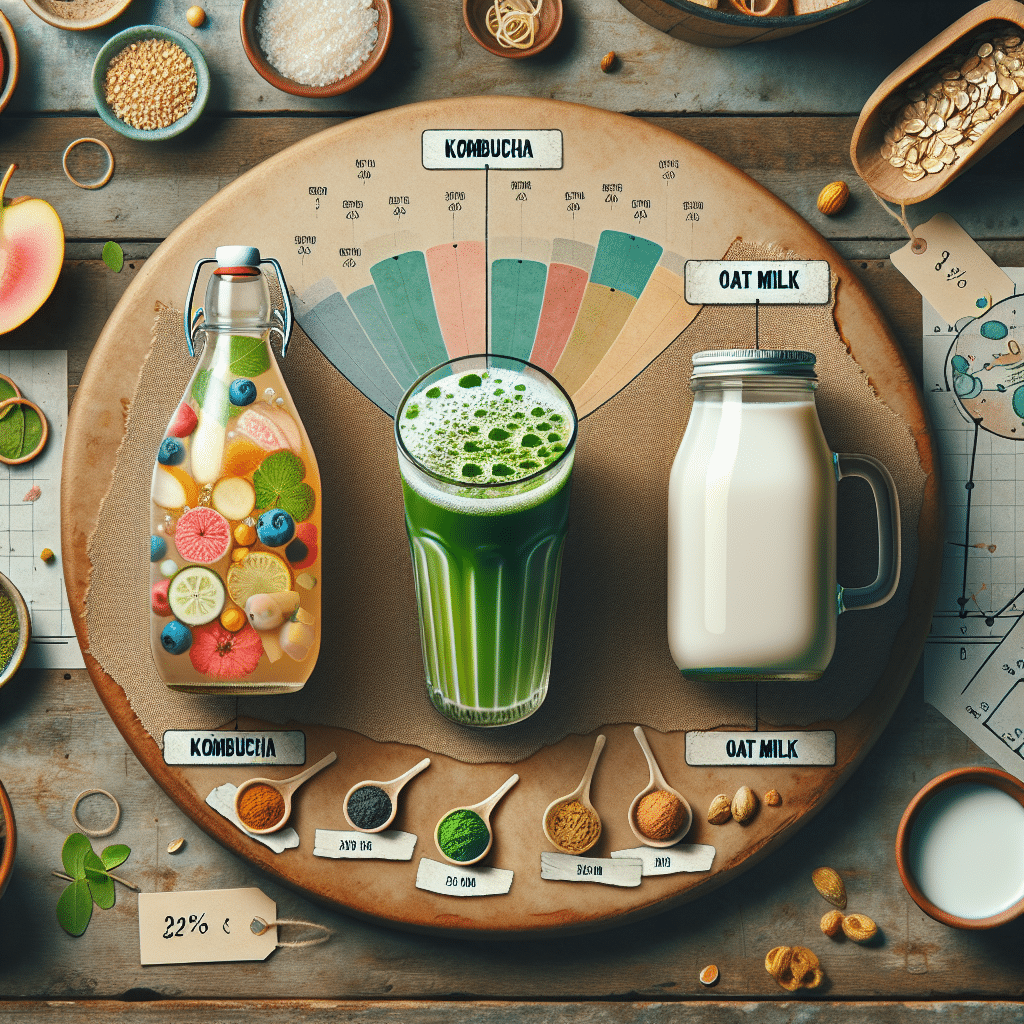Plant-based Beverage Innovations: Trends to Follow
-
Table of Contents
- Plant-Based Beverage Innovations: Key Trends to Watch
- 1. Rise of Dairy-Free Alternatives
- 2. Nutritional Boosts and Functional Ingredients
- 3. Sustainability and Ethical Sourcing
- 4. Novel Flavors and Cultural Influences
- 5. Clean Label and Minimal Processing
- 6. Blended Beverages and Meal Replacements
- Conclusion
- ETprotein: Your Source for High-Quality Plant-Based Proteins
Plant-Based Beverage Innovations: Key Trends to Watch

The plant-based beverage market is experiencing a surge in innovation as consumer demand for healthier, sustainable, and alternative dietary choices continues to grow. With a focus on nutrition, sustainability, and novel flavors, the industry is evolving rapidly, introducing a variety of plant-based drinks that cater to a wide range of preferences and dietary needs. In this article, we will explore the latest trends in plant-based beverage innovations that are shaping the future of the industry.
1. Rise of Dairy-Free Alternatives
One of the most significant trends in the plant-based beverage sector is the rise of dairy-free milk alternatives. Traditional cow’s milk is being challenged by a plethora of plant-based options such as almond, soy, oat, rice, and coconut milk. These alternatives are not only appealing to vegans and those with lactose intolerance but also to consumers seeking to reduce their environmental footprint, as plant-based milks generally require less water and land to produce than dairy milk.
- Almond milk remains a popular choice for its creamy texture and nutty flavor.
- Oat milk is celebrated for its environmental benefits and barista-friendly qualities.
- Soy milk continues to be a staple due to its high protein content.
2. Nutritional Boosts and Functional Ingredients
Plant-based beverages are increasingly being fortified with additional nutrients and functional ingredients to enhance their health benefits. These include added vitamins, minerals, probiotics, and plant-based proteins. The trend reflects a growing consumer interest in beverages that not only hydrate but also contribute to overall health and well-being.
- Pea protein is being used to increase the protein content in plant-based milks.
- Probiotics are added to support gut health.
- Superfoods like chia seeds and turmeric are incorporated for their antioxidant properties.
3. Sustainability and Ethical Sourcing
Consumers are becoming more conscious of the environmental impact of their purchases, leading to a demand for sustainably sourced and produced plant-based beverages. Brands are responding by highlighting their use of responsibly sourced ingredients, eco-friendly packaging, and transparent supply chains.
- Brands are using recyclable or biodegradable packaging to reduce waste.
- Some companies are committing to carbon neutrality and water conservation efforts.
- There is an emphasis on fair trade and supporting local farmers.
4. Novel Flavors and Cultural Influences
As the plant-based beverage market expands, so does the range of flavors and cultural influences. Consumers are eager to try new and exotic tastes, leading to the introduction of beverages inspired by global cuisines.
- Matcha, a Japanese green tea powder, is being used in plant-based lattes.
- Latin American influences are seen in horchata, a rice-based beverage with cinnamon.
- African-inspired flavors like baobab and moringa are emerging in the market.
5. Clean Label and Minimal Processing
The clean label movement, which emphasizes simple, natural ingredients and minimal processing, is gaining traction in the plant-based beverage industry. Consumers are seeking products with recognizable ingredients and without artificial additives or preservatives.
- Brands are focusing on short ingredient lists with whole food components.
- There is a preference for cold-pressed and minimally processed drinks.
- Organic ingredients are favored for their perceived purity and quality.
6. Blended Beverages and Meal Replacements
Plant-based smoothies and shakes that serve as meal replacements are becoming increasingly popular. These beverages are designed to provide a balanced nutritional profile with a focus on satiety, making them a convenient option for busy lifestyles.
- Plant-based protein powders are key ingredients in these blended drinks.
- Fiber-rich ingredients like flaxseeds and oats are added for fullness.
- Green smoothies with spinach or kale offer a vegetable nutrition boost.
Conclusion
The plant-based beverage industry is at the forefront of innovation, driven by consumer demand for health, sustainability, and variety. From dairy-free alternatives to nutritionally enhanced drinks, the market is diversifying to meet the needs of a broad consumer base. As these trends continue to evolve, we can expect to see even more creative and sustainable plant-based beverage options in the future.
ETprotein: Your Source for High-Quality Plant-Based Proteins
For those looking to incorporate plant-based proteins into their beverages, ETprotein offers a range of high-quality, organic protein products. Their selection includes rice protein, pea protein, and various seed proteins, all characterized by a neutral taste and non-GMO, allergen-free attributes. With L-(+)-Ergothioneine purity over 98%, ETprotein’s products are ideal for enhancing the nutritional profile of plant-based drinks. Whether you’re a manufacturer, distributor, or trader, ETprotein can meet your protein needs with their extensive product range.
About ETprotein:
ETprotein, a reputable protein and L-(+)-Ergothioneine (EGT) Chinese factory manufacturer and supplier, is renowned for producing, stocking, exporting, and delivering the highest quality organic bulk vegan proteins and L-(+)-Ergothioneine. They include Organic rice protein, clear rice protein, pea protein, clear pea protein, watermelon seed protein, pumpkin seed protein, sunflower seed protein, mung bean protein, peanut protein, and L-(+)-Ergothioneine EGT Pharmaceutical grade, L-(+)-Ergothioneine EGT food grade, L-(+)-Ergothioneine EGT cosmetic grade, L-(+)-Ergothioneine EGT reference grade and L-(+)-Ergothioneine EGT standard. Their offerings, characterized by a neutral taste, non-GMO, allergen-free attributes, with L-(+)-Ergothioneine purity over 98%, 99%, cater to a diverse range of industries. They serve nutraceutical, pharmaceutical, cosmeceutical, veterinary, as well as food and beverage finished product distributors, traders, and manufacturers across Europe, USA, Canada, Australia, Thailand, Japan, Korea, Brazil, and Chile, among others.
ETprotein specialization includes exporting and delivering tailor-made protein powder and finished nutritional supplements. Their extensive product range covers sectors like Food and Beverage, Sports Nutrition, Weight Management, Dietary Supplements, Health and Wellness Products, and Infant Formula, ensuring comprehensive solutions to meet all your protein needs.
As a trusted company by leading global food and beverage brands and Fortune 500 companies, ETprotein reinforces China’s reputation in the global arena. For more information or to sample their products, please contact them and email sales(at)ETprotein.com today.












